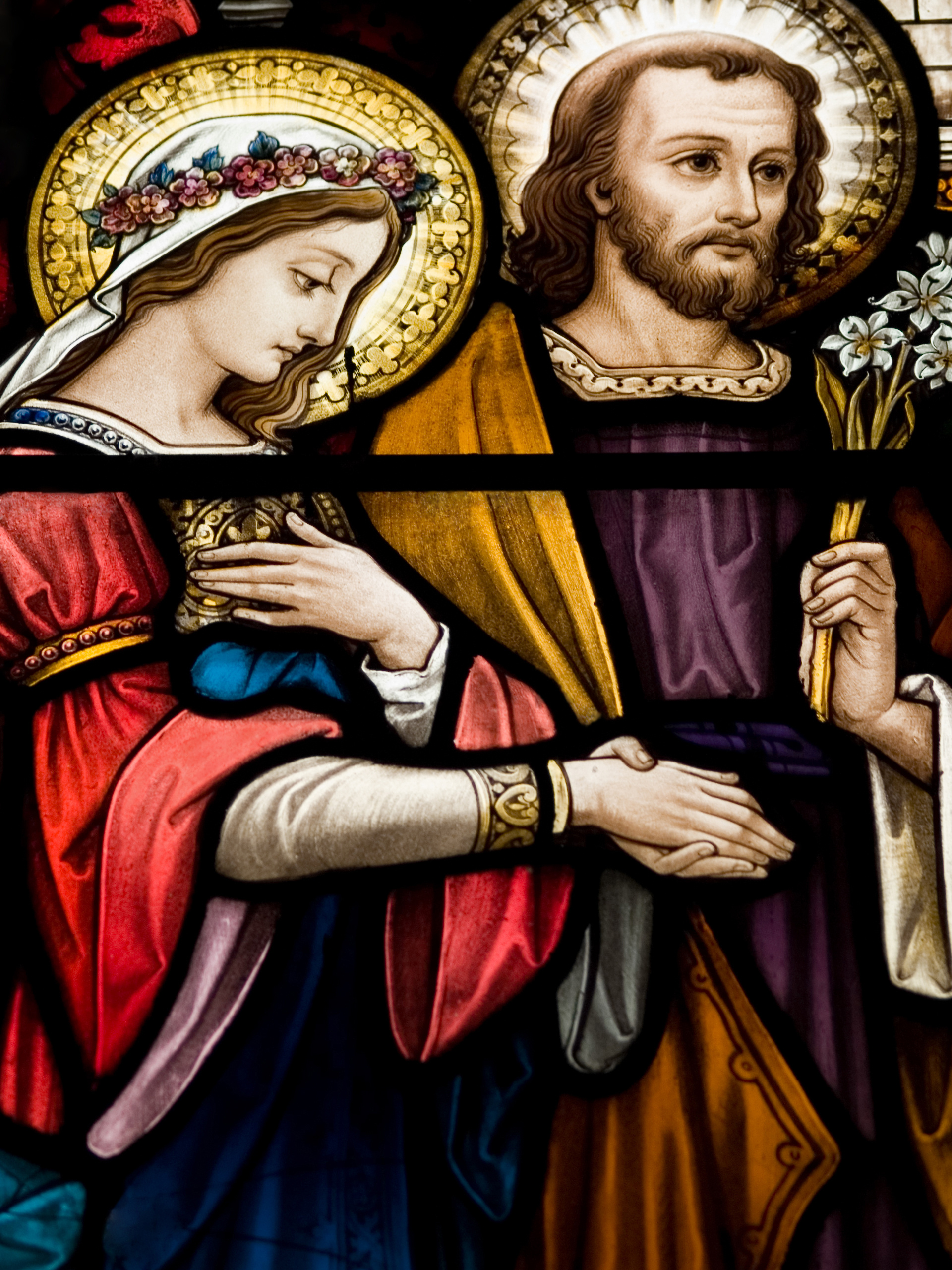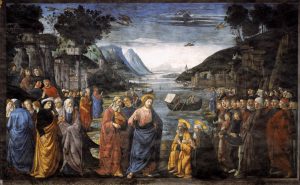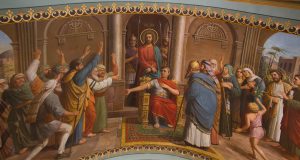
By Laurie Stiegelmeier
The air was filled with birdsong and the scent of lilacs as a pair of mourning doves built a nest together in the tall spruce tree outside my open window, despite competition for the space. I watched as the peaceful male dove defended his mate and her home from the noisy and aggressive blackbirds.
Then it seemed the female dove was left alone, devotedly incubating her eggs. Day after day, she remained. During a cold, hard rain she stayed, wings outstretched to keep the nursery dry. Just as I thought of how hungry she must be after so many days, the male arrived and landed lightly on her back. She tipped her head up and he fed her! I watched him make several flights away, returning with more food for his mate. I was witnessing the complementarity of male and female in the animal kingdom.
Crown of creation
Genesis tells us that as God created the universe, he saw that each thing was good. Then Genesis 1:27 reads, “God created mankind in his image; in the image of God he created them; male and female he created them.” After that, God looked at creation and found that it was very good. Man and woman completed and crowned creation.
In his beautiful teaching “Theology of the Body,” St. John Paul II explained that one of the ways we are created in the image and likeness of God is in our complementary differences as male and female. Just as God is a communion of persons united in love, man and woman become a communion of persons by becoming a sincere gift of self to each other. This communion allows them to mirror the Trinity and participate in the unity of heaven on earth. This should leave us in awe.

If God created only one gender, there would be no communion, no understanding of God as a communion of persons, no foretaste of heavenly unity—because we would not have a gift to give that the other didn’t already possess. But in his genius, God created male and female to complement each other on every level, from egg and sperm, to the design of our bodies, to our very being.
“God created male and female; Jesus says this in the Gospels of Matthew and Mark when defining marriage as a sacrament,” Father James Morgan, rector at the Cathedral of Saint Joseph, said. “God creates this way because he creates out of his essence; male and female are created for relationship, as God is in relationship. Sure, masculine and feminine natures give us our identity, but this compliment of natures, this interaction of natures, is how we realize that we are loved by God, and thus we can possess self-love.”
While Adam and Eve were the prototype, the marriage of Mary and Joseph is the highest example of total self gift.
“Joined in their profound love for each other and God, Mary and Joseph reveal the ideal model of a couple laboring in a united mission,” Trish Irvine, parishioner at St. Lambert Parish (Sioux Falls) and a theology teacher at Bishop O’Gorman High School, said. “Each is entrusted with a particular mission, one which will flounder if they stubbornly seek to do the mission of the other.”
Effects of the fall
St. Faustina said, “I know well that the greater and more beautiful the work is, the more terrible will be the storms that rage against it.” Women, men, the family—and the very meaning of male and female—are under attack by powerful forces that want to destroy God’s greatest creation. Father Morgan gave this chilling observation, “Think of the beginning of the movie ‘The Passion of the Christ’ and how Satan is depicted as androgynous.”
On this spiritual battlefront, male and female are no longer a matter of chromosomes and physiology but defined as “whatever a person says or feels it is.” Like Adam and Eve, who grasped at what God did not give them and lost paradise, objective truth and the great gift of true masculinity and femininity are lost when grasping for an identity other than who God created us to be.
Unlike the view that’s very common today that we exist in isolation from others, Trish said that humanity must be seen as created to be in relationship. “As the secular world detaches humanity from God and any objective morality, it also detaches us from being able to truly understand humanity,” she said. “Only in the light of God and his work in creation can we understand humanity, with our particular gifts as men and women, as well as the way we are called to work in union.”
Armed with truth
St. John Paul II warned, “Once the truth is denied to human beings, it is pure illusion to try and set them free. Truth and freedom go together hand in hand or together they perish in misery.” Armed with the truth that being male and female is stamped into our bodies and souls as part of God’s plan, we can set ourselves—and, hopefully, with great compassion, our suffering brothers and sisters—free.
Father Morgan believes we need to communicate our message better.
“We don’t do a good job of selling ourselves well, either because we are afraid to engage the culture, or when we do, we meet the culture on its own terms,” he said. “Jesus sent his disciples to the four corners of the earth to engage people and form relationships for the good of eternal salvation. We need to be better engagers.”
The bridegroom and the bride
The message of truth we need to communicate in our words and actions comes from the complementarity of the male and female genius as shown to us in the Bridegroom (Jesus) and the Bride (the Church).
Father Morgan said Jesus’ entire mission was to provide for his Bride in love so she could carry on that mission of service in love. “Christ gives; the Church receives and responds. Men and women have this same analogous relationship and mission. God endows male and female with characteristics particular to their natures, creating in such a way as to enhance or emphasize the qualities of each other. This is for the good of both the male and the female, to reflect in their intimate relationship the relationship of Christ and the Church.”
“Men are called to have a servant’s heart that is willing to make tremendous sacrifices, to the point of death, for the ones he loves,” Trish said. “It means being united to a mission that goes beyond personal successes and ego. Christ’s love for the Church invites men to find strength in humility and a magnanimous heart through a million small and unseen sacrifices.”
“Simply put, men are to be the spiritual leaders of their wives and their families,” Father Morgan said. “The masculine nature is one that I like to say perceives, protects and provides. Beyond the literal meaning of these words, true masculinity loves self-sacrificially with the good of wives and family in mind. Perceiving, protecting and providing seeks holiness and virtue as its end, understanding that the degradation of marriage and family is the work of the evil one. As spiritual leader of the family, he needs to perceive, protect and provide in a way that gets his family to heaven.
“The beauty of the Church,” Father Morgan continued, “is that she receives the faithful, nurtures them in Word and sacrament, and then gives them back to our Lord as an act of adoration. So too, women as the more affective and nurturing nature, receive love and nurture it in a way that the love is returned. This is what is meant by ‘submission.’ Not ‘subsequent,’ not ‘subordinate’ in the true definition of those words, but ‘effective’ and ‘responsive.’ Wherever she returns and nurtures love, it multiplies that much more.”
In receiving the love of the Bridegroom, Trish says the Church is a home of life, goodness and flourishing. “This noble task is also entrusted to all women. The submission of the Church to Christ invites women to share in the experience of uniting her gifts to the larger mission of Christ in the redemption of humanity.”
Trish said it is necessary to remember that men, as part of the Church, must grow in their capacity to receive—something that seems more natural and inherent in women. “While men follow Christ as their model, they also seek to receive all good things from the Lord and share in a deep, personal relationship with him.”
Inherently complementary beyond marriage
Communion of persons isn’t only for spouses. It exists when two or more people give themselves to one another in a love that desires only the best for each other as images of God. From two spouses it flows to immediate and extended family. Father Morgan sees communion of persons in the family’s relationship to the Church where there is a universal communion of relationships.
“I see this in the cathedral where varied cultures come together to be in communion as Church,” Father Morgan said.
He includes chaste friendship and religious life as other examples, saying it is evident that Jesus created a communion of relationships that were both hierarchical and for the service and good of each other and the Church.
“Friendships between men and women can be good places to see the complementarity of the sexes,” Trish said. “I’ve had friendships with men where our specific viewpoint was enlightening and helpful to the other. As all friendship can be, these relationships became genuine places of iron sharpening iron (Prv 27:17) and brought about great fruitfulness.”
She has also seen the unique qualities of men and women used to bear fruit in ministry experiences: sidewalk counseling at an abortion clinic, leading a foreign mission trip and in her volunteer prison ministry.
“I have seen the ways that men and women working in union yield a greater outcome than working separately or in opposing missions,” she said.

Trish says it seems that women have the capacity to enable men to recognize their emotions more fully. In stories her sister shares about work in prison ministry, she learned that men seem more able to process their feelings with a woman rather than a male chaplain.
“Woman, so often portrayed or seen as highly emotional, can be considered a safe place to explore the tumultuous experiences of the heart,” she said. “St. Edith Stein speaks of women being this place of welcome, saying, ‘The woman’s soul is fashioned as a shelter in which other souls may unfold.’
“While emotions are an important part of our humanity, men can offer to women a perspective of stepping back from emotions to observe situations in a way which is helpfully more removed,” she continued. “Compartmentalizing can be harmful, but it can also be a gift in moments when emotions run roughshod over rational considerations.”
While noting this, Trish says we must look beyond stereotypes to consider a more robust view of the human person. “Instead of reducing men to intellectual and women to emotional, it is helpful to see the integration of thoughts and emotions in each human person.”
“It is not enough to understand, or even accept, the differences in our natures as men and women, they must be embraced as strengths,” Father Morgan said, explaining that this allows man and woman to work at being sincere gifts to the other to fulfill their roles as a true “helper” of the other.
Father Morgan added that vulnerability for the good of each other is needed in self-giving. “Now, we may not think of vulnerability as a gift, per se, but vulnerability provides meekness of spirit and the docility of heart, leading to humility and attentiveness.”
Going back to the beginning, we read in Genesis 2:18, “The Lord God said: It is not good for the man to be alone; I will make him a helper suited to him.” This suitable and mutual help is not only found within marriage, but also wherever men and women work together in religious, cultural, educational, economic, artistic, social and political areas of society. We need each other’s unique way of processing information, perceiving the world, tackling projects and relating to others.
Whether you are young or old, single or married, consecrated or layperson, we reach a greater potential when we share our respective genius in cooperative work. The reason is powerfully explained by St. John Paul II: “It is only through the duality of the masculine and the feminine that the human finds full realization.”
Man + Woman = Fully Human … in a heart. That would be beautiful carved on the spruce tree’s trunk under the mourning dove nest. It’s the message we need to engrave on our hearts; the message to share everywhere.


